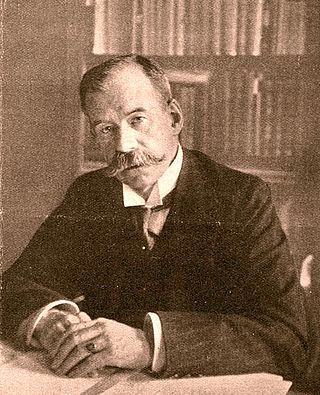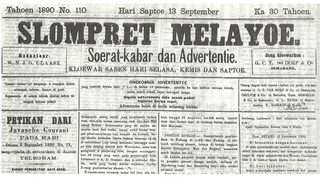
Bima is a city on the eastern coast of the island of Sumbawa in central Indonesia's province of West Nusa Tenggara. It is the largest city on the island of Sumbawa, with a population of 142,443 at the 2010 census and 155,140 at the 2020 census; the official estimate as at mid 2022 was 157,362. It is separate from the adjoining Regency of Bima which had a population of 520,444 according to the mid 2021 official estimates..

Willem Anthony Engelbrecht, also known as Willem Anthonie Engelbrecht, was a Dutch jurist and colonial administrator. He was one of the originators of the so-called "Dutch Ethical Policy" in the Dutch East Indies.

Conrad Theodor "Coen" van Deventer was a Dutch lawyer, an author about the Dutch East Indies and a member of parliament of the Netherlands. He became known as the spokesman of the Dutch Ethical Policy Movement. He lived at Surinamestraat 20, The Hague (1903–1915), former residence of John Ricus Couperus, his son writer Louis Couperus and the rest of his family (1884–1902).
Khouw Oen Giok Sia, later more popularly known as Oen Giok Khouw or O. G. Khouw, was a philanthropist and landowner in the Dutch East Indies. He gained notoriety for acquiring Dutch citizenship, thus breaking down the race barriers of colonial society. Today, he is best remembered for his extravagant mausoleum in Petamburan, Jakarta.

Tio Tek Ho, 4th Majoor der Chinezen was an ethnic Chinese bureaucrat in the Dutch East Indies who served as the fourth and penultimate Majoor der Chinezen or Chinese headman of Batavia, now Jakarta, capital of Indonesia. This was the most senior position in the Chinese officership, which constituted the Chinese arm of the civil bureaucracy in the Dutch East Indies. As Majoor, Tio was also the ex officio Chairman of the Chinese Council of Batavia, the city's highest Chinese government body.
Khouw Tjeng Kee, Luitenant-titulair der Chinezen was a Chinese-Indonesian magnate and landlord in Batavia, capital of the Dutch East Indies.

Khouw Yauw Kie, Kapitein der Chinezen, also spelled Khouw Jaouw Kie, Yaouw Kee, was a high-ranking Chinese-Indonesian bureaucrat. He was the first scion of the influential Khouw family of Tamboen to serve on the Chinese Council of Batavia.
Khouw Tjeng Po, Luitenant-titulair der Chinezen was a Chinese-Indonesian magnate and landlord in Batavia, the capital of the Dutch East Indies.
Francisca Louisa Zecha (1848–1939), usually known as Louisa Zecha, was a prominent, colonial Indonesian community leader and the Indo-Bohemian matriarch of the Lauw-Sim-Zecha family, part of the 'Cabang Atas' gentry of the Dutch East Indies. She attracted significant attention due to her controversial interracial marriages to two Peranakan Chinese magnates, Lauw Tek Lok, Luitenant der Chinezen of Bekasi and Sim Keng Koen, Kapitein der Chinezen of Sukabumi. The posts of Kapitein and Luitenant der Chinezen were high-ranking civil administration positions in the Dutch colonial bureaucracy. Zecha's community leadership, philanthropy, personal bravery and longevity earned her widespread respect and admiration in colonial society by the time she died in 1939.

Algemeen handelsblad voor Nederlandsch-Indië was a Dutch language newspaper which was published in Semarang, Dutch East Indies from 1924 to 1942.
Warna Warta was a Malay language Peranakan Chinese newspaper published in Semarang, Dutch East Indies from 1902 to 1933. Alongside its more popular rival Djawa Tengah, it was highly influential among the Chinese Indonesian population of Semarang during this time.

Selompret Melajoe was one of the first Malay language newspapers to publish in the Dutch East Indies. It was printed in Semarang, Central Java from 1860 to 1920.
Raden Pandji Wirasmo Notonindito, often referred to as Dr. Notonindito, was a Javanese accountant, intellectual and politician in the Dutch East Indies. He founded the short-lived Indonesian Fascist Party in 1933.

Saadah Alim (1897-1968) was a writer, playwright, translator, journalist and educator in the Dutch East Indies and in Indonesia after independence. She was one of only a handful of Indonesian women authors to be published during the colonial period, alongside Fatimah Hasan Delais, Sariamin Ismail, Soewarsih Djojopoespito and a few others. She is known primarily for her journalism, her collection of short stories Taman Penghibur Hati (1941), and her comedic play Pembalasannya (1940).
Soetitah was a Sarekat Islam and Communist Party of Indonesia (PKI) propagandist, activist, and schoolteacher in Semarang, Dutch East Indies in the 1910s and 1920s. She was a close ally of Semaun, Tan Malaka, and other Semarang communists of the time and was chair of the women's section of the party in the early 1920s. She was exiled by the Dutch to the Boven-Digoel concentration camp from 1927 to 1930.
Tan Tiang Po, Luitenant der Chinezen, also spelled Tan Tjeng Po, was a colonial Chinese-Indonesian bureaucrat, landowner, philanthropist and the penultimate Landheer (landlord) of the domain of Batoe-Tjepper in the Dutch East Indies.

Phoa Tjoen Hoat, who also published under the name Th. H. Phoa Sr., was a Chinese Indonesian, Malay language journalist, translator and newspaper editor active in the Dutch East Indies in the early twentieth century.

Phoa Tjoen Hoay, who sometimes published as T. H. Phoa Jr., was a Chinese Indonesian, Malay language journalist, translator, and newspaper editor active in the Dutch East Indies in the early twentieth century. He translated a number of Chinese and European works into Malay, including seven volumes of Sherlock Holmes by Arthur Conan Doyle.
Abdul Rasjid Siregar gelar Mangaradja Mahkota Soeangkoepon, commonly known as Dr. Abdul Rasjid, was a politician and physician in the Dutch East Indies. He was elected or appointed to the Volksraad from 1931 to 1942, during which time he sat with the Indonesian nationalist faction. During the 1930s, he became convinced that public health and cooperation with traditional healers should be central to the mission of physicians in the Indies.

Kho Tjoen Wan, sometimes spelled Kho Tjoen Gwan, was a Chinese Indonesian journalist, writer and political activist active mainly from the 1910s to the 1930s in the Dutch East Indies. He was involved with the Communist Party of Indonesia in the 1920s and may have been its first ethnically Chinese executive member.











